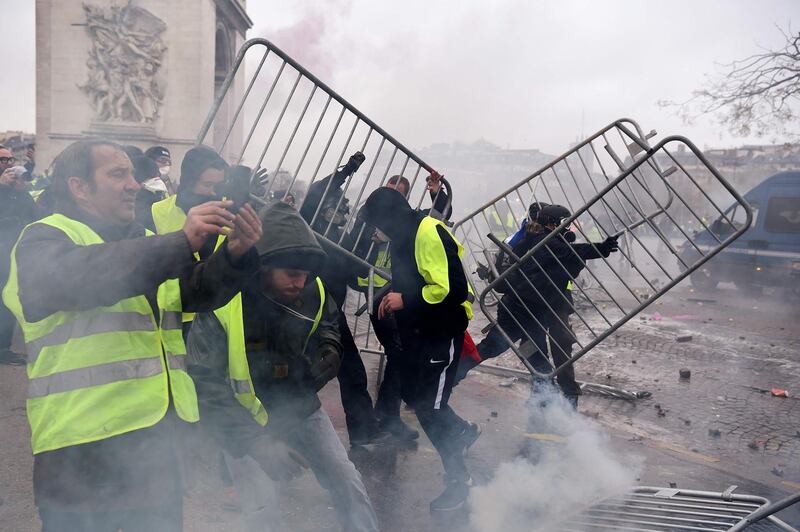Police fired tear gas to disperse protesters trying to tear down barricades on the Champs-Elysees in Paris early Saturday as hundreds converged on the city for new demonstrations, with anger over fuel taxes morphing into a wide-ranging anti-government movement.
Clashes between police and demonstrators wearing the high-visibility yellow vests, which have become the symbol of the protest against President Emmanuel Macron, broke out soon after crowds began gathering near the Arc de Triomphe, at the top of the famous avenue.
The Champs Elysees itself was on lockdown, its glittering Christmas decorations standing in stark contrast to boarded-up storefronts and throngs of riot police manning barricades and water cannon. Dozens of arrests were made in the first few hours of the protest.
Some officers, wearing protective gear and helmets, were spattered with vivid yellow paint.
Banks, wine shops and cafes on surrounding streets were also racing to cover up windows on Saturday, as the acrid odor of tear gas and burning trash containers filled the air.
Several protesters wore face masks, while others carried gas masks or ski goggles.
Other protests were expected around France by people angry over a surge in fuel prices this year which they attribute to a series of tax increases to finance the government's anti-pollution efforts.
"With all these tax hikes, there's not much left for eating at the end of the month," Philippe, a high school cook in the Essonne region outside Paris, said near the Champs Elysees on Saturday.
The protests come a week after violent clashes on the avenue last Saturday, marked by burning barricades and vandalism which Macron compared to "war scenes".
Some 5,000 officers have been mobilised and were carrying out ID checks and searches for people hoping to reach the Champs Elysees.
"Our responsibility is to ensure that everything goes as well as possible," Interior Minister Christophe Castaner said while touring the forces on the avenue.
Mr Castaner had already said on Thursday that "far left and far right activists" were preparing for fresh clashes with the police.
The "yellow vest" movement erupted on social media in October and has since become a wider protest against Macron, who is accused of failing to recognise the rising costs of living that has left many struggling.
_______________
Read more:
'Lebanese Connection' drug trial of Hezbollah agent to open in Paris
Hezbollah moneymen face French justice after global wave of arrests
_______________
The first day of protests, on November 17, attracted around 282,000 people, while some 106,000 turned out last Saturday, including 8,000 in the capital.
The protests include many pensioners and has been most active in small urban and rural areas where it has blocked roads, closed motorway toll booths, and even walled up the entrance to tax offices.
Two people have died and hundreds have been injured in the protests which opinion polls suggest still attract the support of two out of three French people.
Attempts by the government to negotiate with the movement have failed, in large part because representatives have insisted on public talks broadcast on TV.
"We want our dignity back and we want to be able to live from our work, which is absolutely not the case today," Jason Herbert said after walking out of talks with Prime Minister Edouard Philippe on Friday.
Macron has sought to douse the anger by promising three months of nationwide talks on how best to transform France into a low-carbon economy without penalising the poor.
He also vowed to slow the rate of increase in fuel taxes if international oil prices rise too rapidly but only after a tax hike due in January.
But many protesters were unconvinced by Macron's speech on Tuesday.
"What we need is something tangible, not just smoke and mirrors," said Yoann Allard, a 30-year-old farmhand.
Trade union leaders, who met Friday with Philippe, have called for a moratorium on January's tax hike, a suggestion which some pro-Macron members of parliament have started to endorse.
The anger has reached French overseas territories, especially on the Indian Ocean island of Reunion.
The minister for overseas territories, Annick Girardin, who was dispatched to the island to talk to protesters, was forced to cut short a meeting Friday with demonstrators after they booed her and shouted "Macron, resign!"
The movement has spilled across to neighbouring Belgium, where riot police used water cannon Friday to disperse stone-throwing "yellow vest" protesters who burned two police vehicles in the centre of Brussels.






